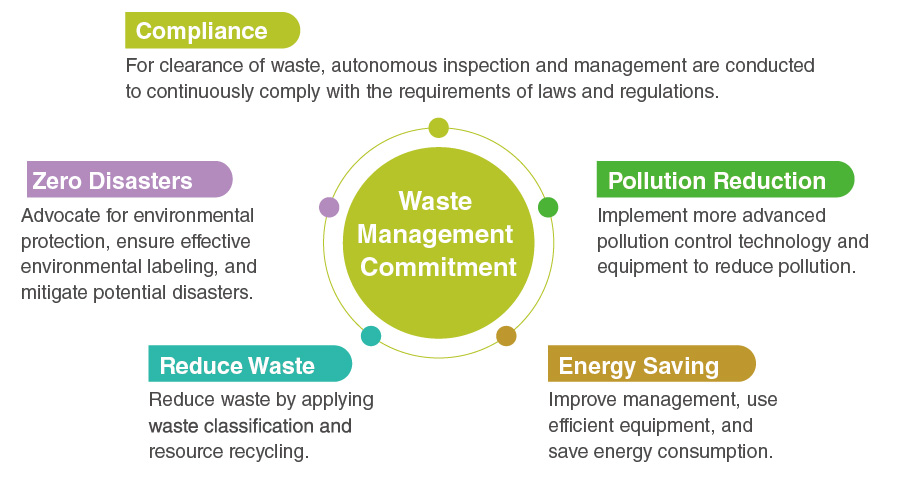Sustainability
Sustainability
Waste Management
TSC is dedicated to reducing environmental impacts, specifically waste pollution, while cutting operating costs by refining waste management and improving resource utilization efficiency. Consequently, both sites have been certified by ISO 14001 environmental management system and conduct regular internal audits based on the system. To implement waste reduction, declaration, and cleaning (removal, treatment and reuse), TSC collects the resource-type waste generated from the site and classifies it based on its nature, and entrusts it to the external clearance. Moreover, for special waste generated during the process, such as chemical solvents, are temporarily stored in specific areas after classification, and are handled by qualified clearance companies approved by the government authorities. On the part of grasping the final flow of waste, TSC also formulated an audit plan for waste clearance companies, including tracers, GPS tracking, etc., and established a complete contractor management mechanism to actively implement waste management.

Waste Clearance and Management
Due to the distinct nature of processes at the I-lan Site and Li-Je Site, the types of waste generated differ to some extent. Consequently, both sites of TSC have developed their own “waste clearance process” to enhance waste management. This includes staying updated on Taiwan’s laws and regulations, periodically assessing the implementation status, organizing meetings, and conducting regular reviews and corrections to ensure effective waste management.
I-lan Site Waste Reduction Plan
In the past, when our site purchased new equipment and materials, we would often end up with a significant amount of waste packaging materials, such as wooden pallets and crates, which were typically incinerated. In order to actively promote waste reduction, TSC’s I-lan Site will be collaborating with external clearance manufacturers in 2023. Our goal is to foster resource recycling by partnering with various industries and implementing recycling plans for wood, strip, and plastic waste. We have set a target to reduce total waste by 10% compared to the previous year, as well as decrease waste treatment costs by 20% from the previous year. We anticipate reviewing the results by 2024. The I-lan Site is actively seeking partnerships with manufacturers to achieve our reduction target and will also explore additional opportunities for waste reuse in the future.
Waste Reduction at Li-Je Site
Li-Je Site actively promotes the utilization of off-site resources, effectively transforming waste from production processes into valuable resources. The reuse percentage for outsourced processing waste reaches an impressive 88.72%, resulting in waste reduction, decreased energy consumption and waste treatment costs, and enhanced efficiency in resource recycling. Our efforts include collaborating with cement manufacturers to recycle calcium fluoride sludge as a raw material in cement production, implementing physical treatment methods to crush and reuse waste glass, and conducting noble metal separation of waste electronic components. Additionally, TSC partners with recycling manufacturers to recover 94.40% of hazardous waste liquid. Through physical treatment techniques like distillation, this liquid is converted into raw materials such as banana oil, which can be further utilized in various industries, including paint production.
Wastewater Management
Effective wastewater management is a crucial aspect of TSC’s sustainable development. The discharge of wastewater can have a direct impact on the local ecology and can also lead to the indirect pollution of the global environment through the spread of pollutants via runoff. TSC has established a stringent objective of “cleanliness improvement” for wastewater management, ensuring that waste liquid from each site is properly treated to prevent contamination of the surrounding soil.
In order to minimize the environmental impact of wastewater, TSC operates its wastewater facility in accordance with the discharge license and complies with the “Effluent Standards” for semiconductor manufacturing. TSC has implemented a comprehensive wastewater management process, which includes daily water quality analysis and regular engagement of third-party verification units to test the quality of effluent water. Additionally, TSC plans to introduce Mechanical Vapor Recompression (MVR) in 2023 to ensure consistent wastewater effluent and meet regulatory standards.
Wastewater Monitoring Mechanism
TSC’s two sites have implemented the “Wastewater Management Operating Procedure” to effectively control and process wastewater discharged during the production process. This procedure clearly regulates wastewater collection, monitoring, recording, testing, and reporting. By strengthening wastewater quality control, we can prevent abnormal effluent quality that negatively impacts the environment. The two sites diligently document the discharge and dosage on a daily basis, ensuring compliance with the effluent quality standards set by the Ministry of Environment. Additionally, they conduct 24-hour monitoring of the wastewater treatment system. The duty staff records the daily wastewater system operation data and water quality analysis values, which are then approved by the system engineer. The unit supervisor reviews these records, and the monthly reports are compiled into charts and submitted to the top supervisor of the site for review.
For more details, please refer to TSC 2022 ESG Report, Chapter 5.



